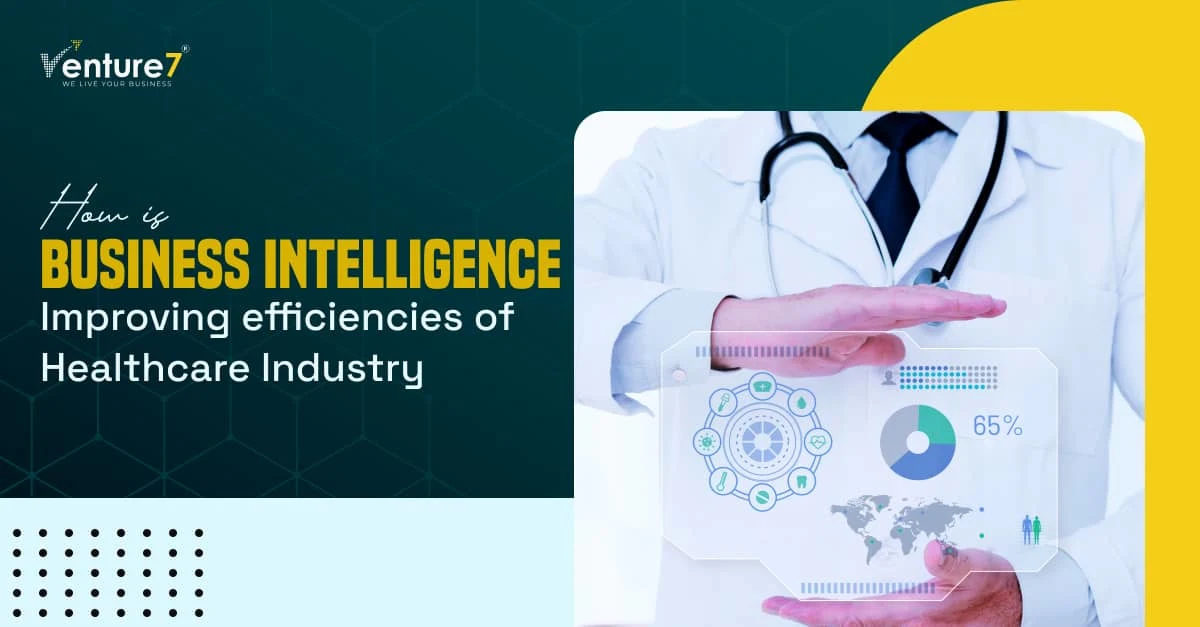The healthcare industry is evolving continuously by exploring the use of diverse technologies and integrating them in various processes of the industry. This sector is rapidly becoming patient-centric and is reshaping its methodologies to enhance patient care and service. Technologies such as artificial intelligence, business intelligence, etc. are highly being implemented by the healthcare industry to carry out the operations in an efficient manner.
Business Intelligence reforming the Healthcare Sector
Business intelligence software is revamping the healthcare industry in several ways with its ability to analyze a huge amount of structured and unstructured data. This technology works with an aim to provide important insights to executives to derive strategic business decisions.
Healthcare professionals often need to collaborate to solve critical cases and perform treatments which make the process time-consuming and delayed due to unavailability of resources. The use of BI technology has improved the decision-making process by simplifying the task of collaborating with different departments and enhancing decision-making process. This has enabled healthcare providers to improve patient care.
Financial Management using Business Intelligence
BI has allowed the healthcare professionals to manage their expenses in a better way with the use of its analytical capabilities that has the ability to identify the core-challenges of the business and offer suggestions to overcome those challenges. This technology has the ability to understand information of healthcare organization and provide important insights to identify potential risks and forecast future events. This has majorly contributed in improving personnel distribution, managing diverse expenses, eliminating unnecessary costs, etc. It has drastically reduced the cost of patient care and the waste associated with treatment by organizing clinical, financial and administrative data in a single unit. This has also eliminated the chances of errors in costing and billing process as the variables can easily be calculated with the data that is stored into a single unit.
Enhanced Patient Care
This technology has made it possible for healthcare providers to enhance patient care and satisfaction by merging all the claims and data reports in a single unit via electronic health records (EHR) which can be used by the physicians as and when needed. The record of all the tests and treatment is stored in EHR that has enabled physicians to eliminate the chances of performing repeat tests, thereby huge amount of costs. This, in turn, enhance patient satisfaction as he does not have to go through the same tests due to missing reports and enables improved patient care.
BI technology has the ability to navigate through the complexities of the healthcare department such as issues related to systems, diagnostics, equipment, patient care, etc. and derive suggestions to resolve the issues. This is done with the use of its advanced analytics tools that carries out its operations by connecting operational, patient and clinical data. This technology has allowed healthcare professionals to track key performance indicators (KPIs) in order to manage diverse operations of the healthcare domain.
Personalized medication using Business Intelligence
Personalized medicine has become a growing trend in this industry as the use of BI tools has made the patient data more accessible. This has simplified the process of analyzing the gathered data which has made it possible for physicians to identify new treatment regimes and implement it as per the needs of the patients. This has made the patient care more personalized with the analysis of their historical and current medical conditions.
BI tools have made it possible for healthcare professionals to identify emergency and trauma patient cases and prioritize them to improve patient outcomes by minimizing costs and delivering the right kind of treatment at the right time. This technology has enhanced the reporting of data with its advanced visualization tools that delivers reports in the form of pictures and graphs, making it presentable and understandable by the physicians. It has enabled the healthcare units to lower their costs by enhancing the visibility to their financial operations. This helps them to identify both profitable and non-profitable services and track income of diverse operations of the healthcare sector. It simplifies the claim processes and maximizes the operational efficiencies by controlling unnecessary expenses and costs.
BI has enabled healthcare professionals to reduce the patients’ waiting time by ensuring that if someone receives an appointment, it is not cancelled. This is ensured by creating diverse patterns from the gathered data and allocating their staff accordingly. The risk management techniques have been drastically enhanced with the use of business intelligence software tools as it has the ability to offer an overall view of patient medical records on the basis of their clinical, social and hereditary metrics. This also enables healthcare institutions to identify medical challenges of a patient well in advance and take precautionary measures to mitigate the risk and provide the best treatment and care to patients.
It has improved the performance of healthcare experts across diverse departments that include administrative tasks, financial tasks, patient care, etc. by offering them the analytical capabilities to establish best healthcare practices and enhance patient care. The growing demand for timely and accurate information has made it necessary for healthcare professionals to bring efficiency in the processes by accurate analysis of data and optimize the activities. The use of BI tools has enabled healthcare providers to optimize their resource management process with effective utilization of resources in order to get high return on investment.
Business Intelligence causing a paradigm shift in the Healthcare Sector
This technology has revolutionized the operations of the healthcare industry by opening a plethora of opportunities to improve patient care and identify various revenue streams to achieve profitable growth. BI has played a key role in managing patient treatment in an enhanced manner with the use of massive amounts of data. The use of centralized electronic health records has made the data accessible to patients too in a language that they can understand. This has helped healthcare professionals to make patients aware of their medical conditions and make them realize the importance of self-care.
The patient costs can now be predicted in a better way with the use of predictive analytics tools which carries out the operations by assessing the chances of patients’ illness, clinical data, potential costs, etc., thereby simplifying the costing and billing process. BI has the ability to mitigate the growing complexities of the healthcare industry by providing a huge amount of data to improve patient outcomes, which is making it an integral component of the healthcare industry.





